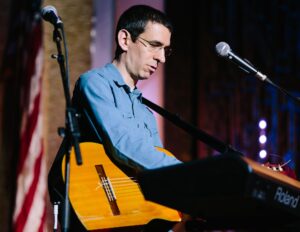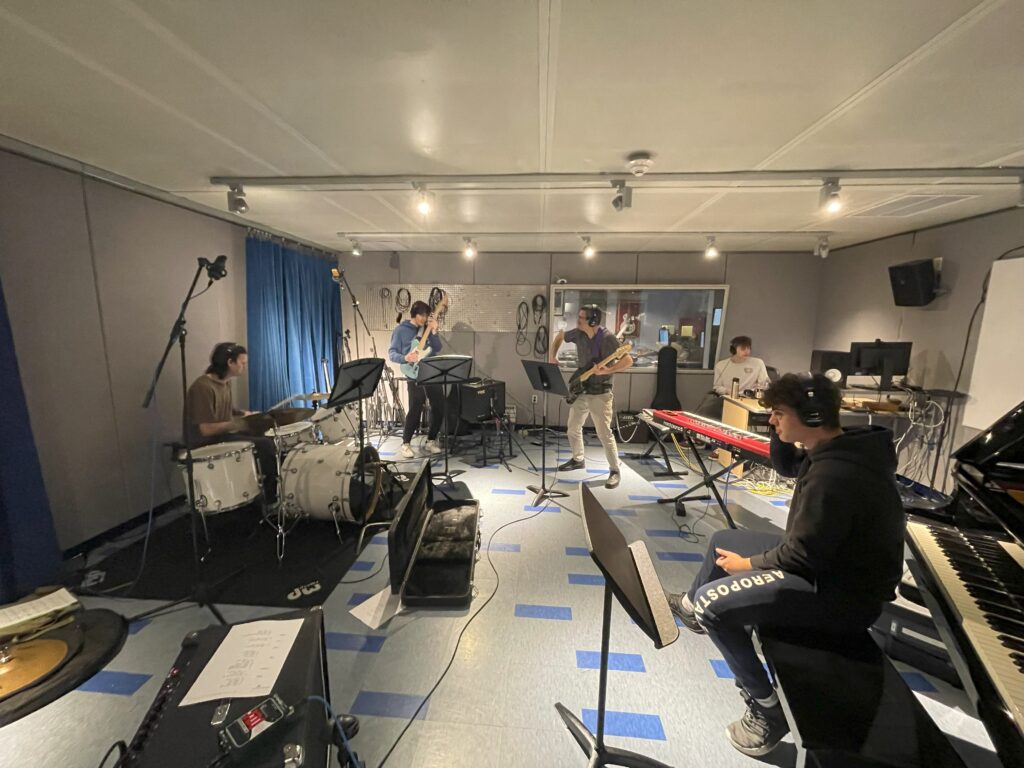- About Ramapo
- Academics
- Admissions & Aid
- Student Life
- Athletics
- Alumni
- Arts & Community
- Quick Links
- Apply
- Visit
- Give
Bridging Worlds Through Music: Professor Gilad Cohen

From the concert hall to the classroom, Professor Gilad Cohen connects music, students, and global sounds
February 5, 2025
by Liz Mendicino ’26
The Ramapo College Sharp Theater will set the stage for the premiere of Between the Suns, a composition by Dr. Gilad Cohen, associate professor of music performance and theory. Part of the Adelphi Orchestra Shostakovich @ 50 concert, the evening will also feature works by Dmitri Shostakovich and Carl Maria von Weber, under the baton of Conductor Maestro Kyunghun Kim. The performance takes place on February 13 at 7:30 p.m. and is presented by the School of Contemporary Arts. A pre-talk with Professor Cohen begins at 7:00 p.m. The concert is free and open to the public. Tickets can be reserved online.
Faculty Spotlight: Gilad Cohen
Professor Cohen joined the Ramapo faculty in 2014 and has been pursuing his twin passions for music and teaching ever since. Through a variety of classes, he helps students across disciplines connect to music, while refining the skills of his advanced music students and preparing them for life after college. “For some artists, teaching is secondary to their art. In my case, I love teaching just as much as composing,” said Cohen. “I find it fun, rewarding, and inspiring, as I always learn from our class activities, from breaking down music concepts and tools, and from my students’ thoughts and ideas.”
His course Shine On: The Music of Pink Floyd and research into a wide variety of musical genres and artists allow him to bring a unique perspective to the classroom, and open doors for students that they would not have considered prior. “I love how curious and open-minded Ramapo students are,” said Cohen. “Every semester brings a few moments that I’ve cherished. I remember a class exercise in an improvisation class in which two student-singers improvised together from scratch, and each of them chose to sing in a different language that their family spoke, none of which was English. Although they didn’t understand each other’s words, and none of us in the class understood the content of their words, the artistic and emotional connection that they created by bringing in their family memories was extremely evident and powerful.”
Through interdisciplinary excellence, Dr. Cohen exemplifies not only the liberal arts mission, but also the necessity for the arts in one’s college experience. No matter what interests a student, there is always a place for them to connect, learn, and grow.

Ryan Chilenski, Thomas Fahy, Julian McManus, and Joseph Tremitiedi, students in Cohen’s songwriting class, jam during a recording session in the Les Paul Studio.
When did your love for music begin?
I grew up with a lot of music at home, mostly as influences by my older brothers, ranging from rock and jazz to classical. I started playing classical piano when I was ten, writing songs shortly after, playing bass and guitar with rock and funk bands, and started arranging for and conducting choirs at the age of 17. From a very young age I remember asking myself questions that still occupy me every day: What makes this moment in this song so moving? Why does this chord break our heart or fill it with joy?
What made you choose to become a professor at Ramapo?
Teaching has always been a passion. Before receiving my Ph.D. from Princeton, I applied for various teaching positions, and I’m happy that I made a good fit for Ramapo. I believe that my intercultural approach to music, including the Pink Floyd Conference that I produced at Princeton and my use of multiple genres in music theory courses – ranging from Tchaikovsky to Alice in Chains, through Chick Corea and Lauren Hill – were appealing for the Ramapo team.
How has music allowed you to connect with both the campus and international communities?
By having my music performed internationally, I feel I connect to people in places I have never even visited. The idea that the smallest decisions that I make on a paper here in New Jersey – should this note be C or C#, short or long, loud or soft? – find their way years later into a concert in Germany, China, or Finland is quite magical. Connecting to the Ramapo community is as meaningful but a much more immediate experience. By creating music with students in class, performing side by side on stage, and touching people’s hearts through public concerts, we make intangible connections between humans. This is both the beauty and the mystery of art.
What has been the most rewarding aspect of becoming a professor at Ramapo?
Connecting with students on artistic, intellectual, and emotional levels has been the biggest reward. Thanks to Ramapo’s focus on contemporary arts and faculty’s ability to design their own courses, I have shaped my courses to fit my intercultural vision and love for varied genres such as classical music, rock, grunge, and funk. Ramapo’s openness has also allowed me to develop new courses such as “Shine On: The Music of Pink Floyd” and “Advanced Music Performance,” the latter teaches professional gigging skills for the performing musician.
What do you love about Ramapo students?
I love how curious and open-minded Ramapo students are. Musicians sometimes develop indifference or even arrogance toward genres that are far from their own. Ramapo students that I’ve worked with were eager to discover unfamiliar territories and experiment with elements outside of their comfort zone.
Are there any moments as a professor that have stuck with you?
Every semester brings a few moments that I’ve cherished. I remember a class exercise in an improvisation class in which two student-singers improvised together from scratch, and each of them chose to sing in a different language that their family spoke, none of which was English. Although they didn’t understand each other’s words, and none of us in the class understood the content of their words, the artistic and emotional connection that they created by bringing in their family memories was extremely evident and powerful.
What projects/compositions/performances are on the horizon?
The next few months will see performances of my chamber works in San Francisco, San Diego, Houston (TX), Brookline (MA), New Haven (CT), France, and Japan. My orchestral piece Between the Suns will be premiered at Ramapo and in New York by Adelphi Orchestra under the baton of Maestro Kyunghun Kim on February 13th and 15th, alongside music by Shostakovich and Weber. I am particular excited about my piece-in-progress Here we Stand for 2 rappers/singers and orchestra, which I co-write with lyricist/rapper Ronve O’Daniel and will receive its World Premiere at MATA Festival in New York in June 2025. Ronve is a Schomburg Scholar at Ramapo this year, and the two of us will offer a glimpse into our piece in a series of events on campus in March 2025. Here We Stand is inspired by the life, mission, and struggles of acclaimed 20th-century bass baritone concert artist, actor, professional football player, and activist Paul Robeson. Robeson fought for the liberation of African Americans and all of humanity alike, but was ultimately ostracized for his complicated relationship to social politics and political views. This piece explores racial issues in the US and compares modern American society with the one in which Paul Robeson lived in in the first half of the 20th century. If you want to hear more about my work or listen to my music, please visit giladcohen.com!
Copyright ©2025 Ramapo College Of New Jersey. Statements And Policies. Contact Webmaster.

Follow Ramapo